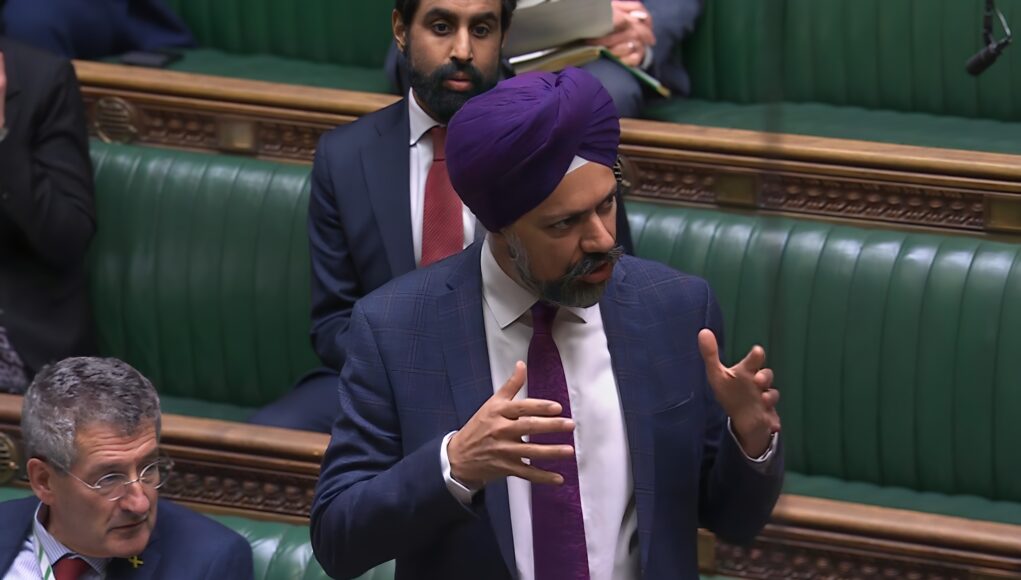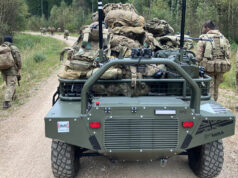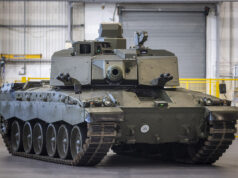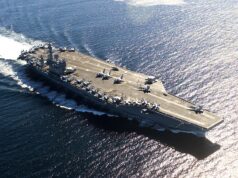During a parliamentary session, Tanmanjeet Singh Dhesi, Labour MP for Slough and Chair of the Defence Committee, raised concerns about delays and cost overruns in major defence programmes.
Highlighting the importance of defence investment for national security and UK-based jobs, Dhesi questioned the Government’s efforts to address inefficiencies in defence procurement.
Dhesi stated, “Major defence programmes are currently in disarray, with only two out of 49 on time and on budget. What actions are the Government taking to fix the waste and mismanagement in the system?”
Responding, Defence Secretary John Healey acknowledged the issue and pointed to previous challenges in defence spending.
“Everyone agrees that more needs to be spent on defence to meet the increasing threats. He asks why only two out of 49 of the major defence projects are on time and on budget. That question may best be directed at the shadow Defence Secretary, the hon. Member for South Suffolk (James Cartlidge), who was responsible for exactly that up until the election six months ago,” Healey said.
Healey added that both the amount spent and the efficiency of spending are critical issues. “There is of course a question about how much we spend, but there is also a challenge in how well we spend it,” he said.
He also referenced criticism from the shadow Armed Forces Minister, Mark Francois, who had described the procurement system under the previous Government as “broken.”
Healey concluded by reaffirming the Government’s focus on reform, stating, “We are getting a grip of MOD budgets, driving deep reform in defence and ensuring that we reduce the waste and delay in procurement contracts.”














They have reformed it, we stopped buying any thing and just do with out.
Oh blame the other lot lol! Ping pong as usual with no action.
Let’s hope it’s just not pray and hope for the best 😕 but in all seriousness for being on of the top military spenders in the world and to have such rubbish procurement is embarrassing
Whatever the colour of the government in place, it is the MoD who are to blame as are civil servants across all departments. None are capable of running a celebration in a brewery let alone any government procurement.
I always make the case for defence spending to stay in the UK. However, I also always argue that sometimes you don’t need to re-invent the wheel and it is far better just to use the appropriate level of technology for the job – giving much better bang-for-buck as it were.
Case in point: Why not buy a whole bunch of cheap, retired US A10s and use them in the anti-drone role. i.e. re-constitute RAF Coastal Command and give ’em A10s, for starters, to help defend these shores (and UK overseas territories) for which the A10 is very well equipped? Might help with recruitment too.
Drones are not an imminent threat to the UK, nor is the A10 what we need to deal with that
Every time a government decides to have a crack at procurement reform it wrecks the previous government’s crack at procurement reform which hasn’t been given time to bed in. Shortening the procurement timescales while necessary is difficult, as you have to find the budget from somewhere and get it validated by everyone from the tea lady to the Lord Almighty. Adding in yet other governance layer in the person of a new National Armaments Director is an interesting approach and I wish the government luck.
Actually I thought the problem with procurement was the treasury not funding any of the programmes. In the end you get fed up. Another part is being risk adverse. So you are not prepared to try something fresh and new. The whole thing seems self defeating.
The Treasury doesn’t provide sufficient funds in an appropriate time frame to pay for everything that the government collectively accepts that MOD needs to procure. Consequently requirements get changed repeatedly during the course of a procurement programme because the original requirements are deemed unaffordable. e.g. the problems with Ajax are largely the fault of GD, but MOD constantly moving the goalposts didn’t help. Another example involves the choice of aircraft for the FAA- the original plan was to buy F35B. Then the government decided to look at F35C because it would allow CAP generation with fewer airframes and so cut costs. Then they realised that the cost of putting an EM catapult on both QE class ships would be expensive, so proposed only fitting out one- which would be insane. So then they went full circle back to F35B. A long and pointless exercise aiming to find savings that weren’t there instead of just accepting what things cost. The QE class ships themselves went over budget because MOD had to repeatedly defer work on them having run out of money. Procurement does need to be reformed to be more cost effective but that isn’t going to happen until the Treasury gets a reality check.
The problem with Treasury was the manner of funding- i.e. funding only released on an in-year basis, meaning savings had to be found within that year’s budget from elsewhere; that’s not normally how projects or programmes are run in the outside world (in my experience). There’s normally a level of contingency and flexibiility in bringing forward spend of the whole project budget in order to benefit from opportunities or de-risk additional costs at the earliest opportunity. Without this, you’re constantly robbing Peter to pay Paul.
I believe that more recent projects, like Dreadnaught, have changed to allow this flexibility- and that delivery has been better on those. But I haven’t kept up to date so may be wrong.
Of course, as you say, Treasury not giving enough money in the first place is also an issue!
A simple answer to all government defence delays? Spend more. Increase the budget.
My question is always going to be how deep is this reform going to go, and who’s leading it? You want some high quality people from a successful industry that’s used to dealing with big money being spent on major, complex, long duration projects to be looking at what’s not working and what is. Oil industry would be one place I’d be looking. They then need to have full access to assess, and there needs to be the commitment to deliver the recommendations they make. I am not in principle anti the Civil Service, nor government committees made up of MPs (i.e. the defence select committee in this case), but they don’t have the experience or expertise- and in some cases they’d be essentially marking their own performance which never works.
From the outside looking in, I see a few challenges:
The problem with how Treasury manages funding to the MOD i.e. funding only released on an in-year basis, meaning any in-year variation in cost has to be balanced by savings to be found within that year’s budget from elsewhere; that’s not normally how projects or programmes are run in the outside world (in my experience). There’s normally a level of contingency and flexibility in bringing forward spend of the whole project budget in order to benefit from opportunities or de-risk additional costs at the earliest opportunity. Without this, you’re constantly robbing Peter to pay Paul. I believe that more recent projects, like Dreadnaught, have changed to allow this flexibility- and that delivery has been better on those. But I haven’t kept up to date so may be wrong.
The structure of programme delivery in MOD apparently involves a regular churn of uniformed personnel, who are not project delivery experts and will be trying to bring their active duty experiences into shaping the specifications of the projects they’re involved in. That’s not, in principle, a bad thing- but put 5 officers in a room and I would imagine that they’d come up with at least 3 different ‘ideal’ specifications for an IFV (for example). Swap out those officers every couple of years, and you end up with 15 ideal specifications rather quickly. That’s before you get to how well-suited those officers are to delivering projects; leading soldiers is a different skill set, and it doesn’t always translate.
Poor change management on the part of MOD. I acknowledge the difficulty in preparing equipment specifications for complex weapons systems and systems-of-systems (i.e. Ajax) that need to fulfil requirements for 20+ years into the future. It’s like looking into a crystal ball. However, the regular changing of scope leads to major change orders and delays- leading to greater costs both in the new equipment procured and the life extension of the in-service older gear.
All 3 of these challenges influence the others, but they all need to be dealt with in order to resolve poor programme delivery at MOD. That’s with the money they already have, let alone any increase to budget. Unfortunately, I doubt that Mr Healey and I have the same view on level of reform required.
Joe, I enjoyed reading your post. Over the years I have seen lots of attempts to reform Defence Procurement (both processes and changes to the delivery organisation). It is staggering that there should still be so many major issues.
The Defence Select Committee does a good job – I have watched many sessions on BBC Parliament TV – Dhesi is an exceptional and well-informed Chairman. His 10 Committee members vary in experience and includes an ex-RAF officer and a past Minister at MoD. They ask searching questions of the MoD. Clearly those with little military knowledge ask more naiive questions, but they are the sort of questions that Joe Public would ask, so that is useful. They hold the MoDs feet to the fire but they do not expedite equipment delivery of course.
Quite right not to blame civil servants (CS) for Procurement foul-ups. CS come in all sorts of flavours – from the low-ranking plodder (E1 or E2 and some D grades) to the fast stream middle-rankers to the Principals (Grade 7) and above. Quality is very variable within each grade – some high rankers can be blockers, low ranking plodders just don’t work fast enough.
I would not agree that CS and Select Committee members don’t have the experience or expertise. Not sure why you say that.
HMT can be a most dangerous enemy – some of their decisions are atrocious. Many programmes have collapsed due to their decisions. Other programmes have ended up costing far more than budgeted for, such as the carriers….due to HMT reprofiling a spend profile or insisting on economies that end up costing more.
There are very few uniformed officers (and a few WOs) in DE&S, but it is reasonable to criticise the churn – most officers have a 2-year posting but some senior officers do 2.5 to 3 years in post. Usefully quite a few officers come back to DE&S at a later stage in their careers. Many officers have to deliver projects during their regimental service but of course they will not be procurement projects. I am not sure how much formal PM training is given to DE&S military officers who are in PM roles.
I don’t see a huge issue with constructing Requirements documents. I recall that there was only one Requirements Manager for each field. In REME we had one RM, a very bright Major, but of course he took input from a wide range of sources and from a number of senior personnel in the Corps.
Requirments documents (originally General Staff Requirement (GSR), then Staff Requirement (Land), and now the User Requirement Document (URD)).User requirements are defined within the User Requirements Document (URD). [The URD is translated into the System Requirements Document (SRD) which provides the basis for a contract between the MOD and a supplier].
Very true that Requirements can change during the long gestation of defence projects – however I understand that there was only one significant revision on the Ajax programme.
One key way of improving programme delivery is to have more Senior Responsible Officers (SRO).
Two fine posts, yours and Joes too.
I guess if programmes were properly specified, properly funded and then procured expeditiously on a fixed price contract (with no dicking around with specification, delivery date and number required) most of these problems would magically disappear overnight.
Also adding a bell curve to Project Manager performance appraisal is also an unpleasant but effective way of improving performance. Significant bonuses for the top 20% and fear of falling into the bottom 20% of performers 2 years in a row and lose your job tends to focus the mind.
It might be a good idea to look at the machines which make our machines. Promise contracts on the basis of required production efficiencies. In the private sector we do this. Funding for year 10 of a service is always less than funding for year 1. We expect the service provider to continually improve and get more efficient over time.
Hi Cog, but of course military officers who are PMs cannot get bonuses.